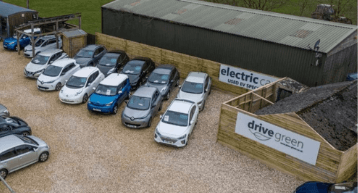 Sustainability was one of the founding principles for Drive Green, a specialist electric vehicle (EV) dealership in Emborough, Somerset.
Sustainability was one of the founding principles for Drive Green, a specialist electric vehicle (EV) dealership in Emborough, Somerset.
Dealers will likely see increasing attention paid to the way they operate to make sure they’re walking the walk, particularly with a larger proportion of vehicles sold becoming zero emissions.
With a business name like Drive Green, its managing director Richard Norris has tried to do everything to make the business as sustainable as possible and has shared with AM some of the ways he has approached cutting carbon.
Norris says: “Our approach to sustainability is very simple. We take a look at everything we do and, if we can find a greener way to do it, we do it.
“There’s no room for apathy or restrictions with the green budget. Quite often trying to do things in a greener way can be more expensive or take more time.”
Norris says switching to a green energy provider is one of the simplest things a dealership can do.
Drive Green uses 100% renewable energy through Ecotricity, which, in Norris’ opinion, is one of the most sustainable green energy providers in the UK. Drive Green’s dealership is located near an Ecotricity wind turbine and so the majority of its energy is generated from that or the energy the site makes itself.
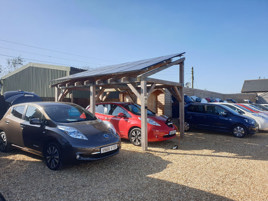 Drive Green has a 4kW solar PV (photovoltaics) array that it can use to power its office and charge a vehicle.
Drive Green has a 4kW solar PV (photovoltaics) array that it can use to power its office and charge a vehicle.
Norris says: “The solar array acts as an example to our customers of the kind of things they can do at home.
“It’s a sensible long-term measure for businesses and households alike.”
Heating is another area that can account for a large proportion of a business’ carbon footprint. Drive Green uses a wood pellet boiler to provide carbon-neutral heating and the structure of the building itself is a temporary one entirely built out of reclaimed and recycled materials.
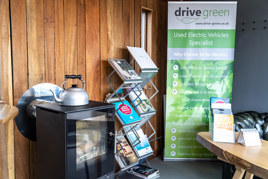 Norris says: “Our sliding doors were found at the back of a glazer’s yard as they had been made to the wrong size for their original order.
Norris says: “Our sliding doors were found at the back of a glazer’s yard as they had been made to the wrong size for their original order.
“All the furniture is second-hand and upcycled. Furniture is a good example of how, with a bit of thought and effort, it’s possible to find a greener solution.”
Norris did use some carbon offsetting as another way to reduce the environmental impact of the building.
This includes planting around 30 trees to offset elements like paintwork and the transport and delivery of the materials to build the site.
He said: “Tree planting will remain part of what we do to offset any elements of carbon that we’re struggling to remove as part of our footprint.”
Wild flower beds are integrated into the frontage of the forecourt.
Rather than buying computer equipment, Drive Green repairs or upgrades used laptops and monitors.
Norris says: “It’s not me being stingy, but I’m just trying to identify all areas where you can do something a bit greener.”
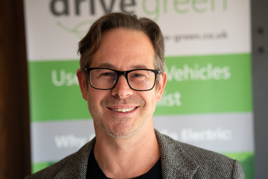 Norris acknowledges that the choice to use a composting loo was not tremendously popular with staff or customers, but it is the greenest way to deal with that element of a business.
Norris acknowledges that the choice to use a composting loo was not tremendously popular with staff or customers, but it is the greenest way to deal with that element of a business.
He said: “It’s difficult to maintain as a public toilet, but we still have it here as it’s the greenest option.
“It’s kind of fun and quirky for our customers, but it might be a step too far for some businesses.”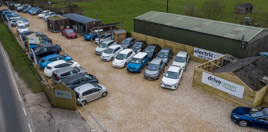
Drive Green’s ethos is that everything that is compostable is composted and everything recyclable is sorted and recycled. There are clearly identified sorting bins on site to make this process as simple as possible.
The dealership uses a lot of paper floor mats in its used vehicles. Norris couldn’t find a business that made recycled versions, so Drive Green actually commissioned its own recycled ones to be made.
Norris says: “We’ve done a few things to encourage greener practices at work. All staff are given a reusable insulated drinks bottle. We don’t use any single-use plastics and we pay an additional £2 a day for every home-made lunch they bring in that has no disposable or single use packaging.”
Drive Green also pays an additional £100 a month to any staff member who drives an EV to work as a way to help finance their zero-emissions commitment.



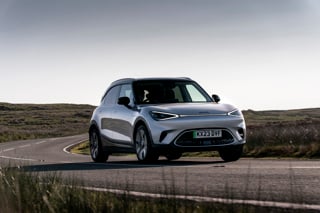
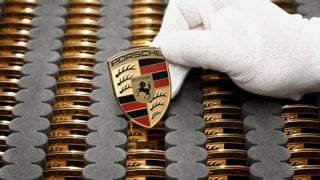
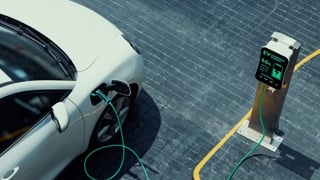

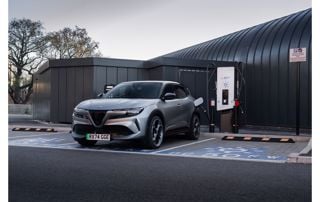







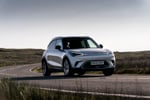





Login to comment
Comments
No comments have been made yet.